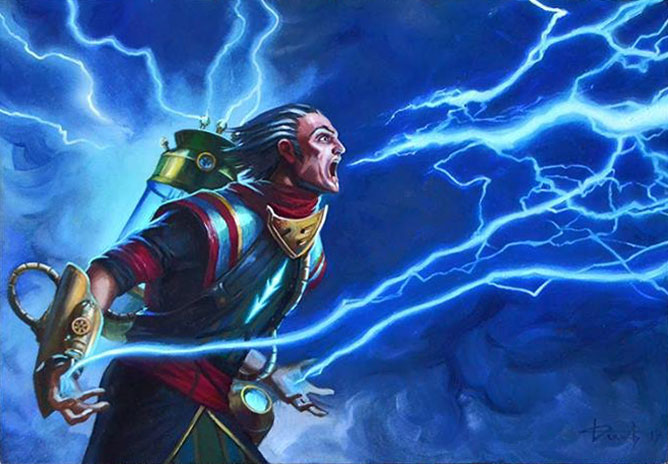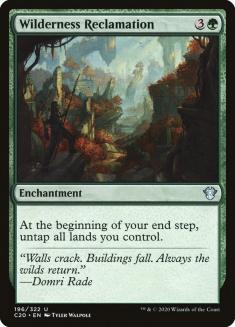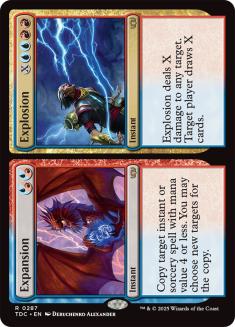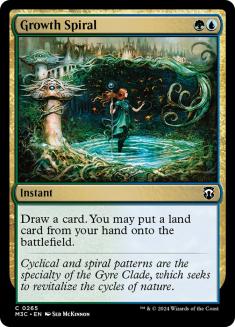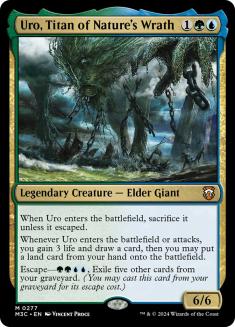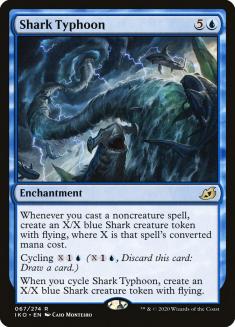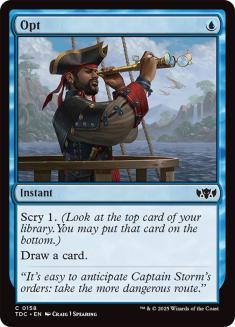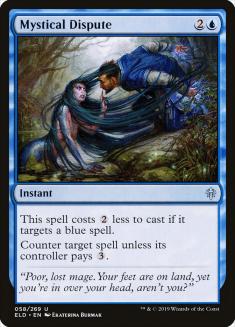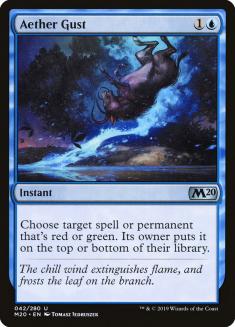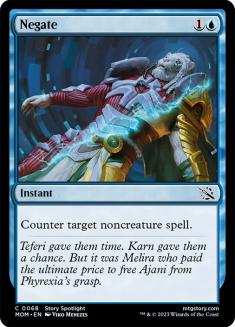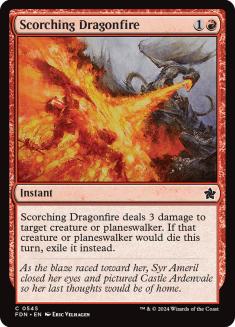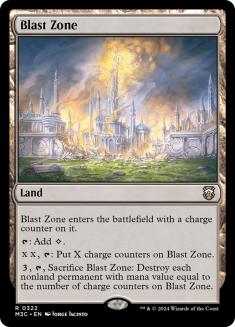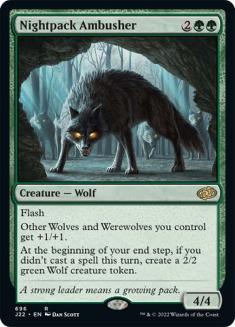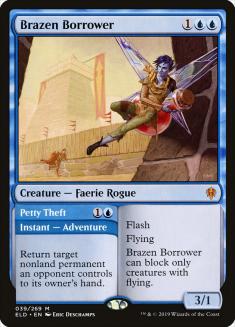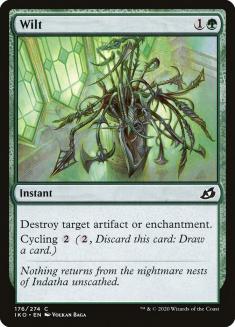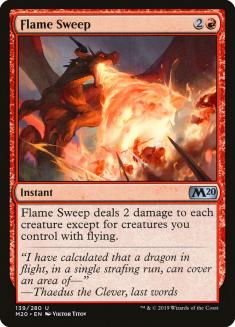Two weeks ago, when I analysed the impact of the bans, I predicted Temur Reclamation would become the new “deck to beat.” This prediction seems to have materialized, as Temur Reclamation has consistently been putting up ban-worthy numbers:

For a deck to be the deck to beat and be on everyone’s radar, end up being 40% of the tournament, and still have an over 55% conversion rate is extremely impressive. Putting six players in the Top 8 is just the icing on the cake. Temur Reclamation might not be the literal best deck to play in this particular tournament, but for almost every meaning of the phrase “best deck” it is the current best deck in Ikoria Standard.
Despite that, there seems to be no agreement on what the best version of Temur Reclamation actually is. Some players like to play four maindeck Aether Gusts and others play zero. Some play four Shark Typhoon and others play zero. Some play Storm’s Wrath, some play Flame Sweep, some play Scorching Dragonfire, and some play none of those cards. Even the sideboard plans vary wildly. Some players cut all Wilderness Reclamations and Expansion // Explosions in the mirror, while others keep all of those in. Some players sideboard in all their Nightpack Ambushers, and some actually take out Aether Gust. In many ways, this is a scary prospect – no one knows what to do and the deck still has a very high win rate, even accounting for all the people who surely must be doing something that lowers their win percentage drastically. If we ever learn what the correct thing to do is, I fear for the rest of the world.
Today, I’m going to tell you what I do and why I do it. I can’t promise you that it’s the strictly correct thing and everyone else is wrong, but those are the conclusions I arrived at after a large amount of testing.
Creatures (3)
Lands (28)
Spells (29)

Wilderness Reclamation + Expansion // Explosion is the “combo” and your primary way of winning Game 1 against most decks. Given how important it is to draw both these cards together, you should just play four copies even if Expansion // Explosion sometimes gets stuck in your hand with no use.
When playing this deck, it’s important to remember that Expansion is actually a card. Not only can you copy your own spells (such as Aether Gust or Scorching Dragonfire), you can also copy theirs — Thought Erasure, Growth Spiral, Migration Path, and Forbidden Friendship are common targets.
I’ve also noticed that players have difficulty finding the right “greed level” with Explosion. Most of the time, it pays off to be not-greedy when it comes to timing, but very greedy when it comes to intensity. What this means is that you don’t need to wait until you can cast Explosion for a large amount to fire it off — sometimes an Explosion for three or four is all it takes to win the game, so you should just do it.
When you do have the ability to cast Explosion for large amounts, however, you should usually do the maximum (unless it’s super-late in the game where the difference between twelve and fourteen cards is very small). Too often I’ve seen a player cast an Explosion for five to keep two mana up for a potential counterspell, not draw that counterspell, and end up losing the game many turns later. In these spots, it’s usually better to just do it for seven and try to beat whatever the opponent can resolve with your extra cards.
Growth Spiral is one of the most important cards in your deck; always play four and never sideboard it out. I say this because I saw a match at the Players Tour Online 1 where the player only had two Growth Spirals in their deck after sideboarding and I want to make sure no reader of mine ever commits this atrocity.
Uro, Titan of Nature’s Wrath is a bit different, but still one of the most important cards in your deck in many matchups. In Game 1, Uro is your Plan B. If you can’t win with a big Explosion, sometimes you can just win with Uro. The flexibility of having a ramp / filtering spell occupy the same slot as your lifegain card and your Plan B card is invaluable.
After sideboarding, Uro becomes even more important . Many of the cards that punish Uro (like Claim the Firstborn or Glass Casket) will no longer be in their deck, or will no longer be present in such big amounts, and the game slows down as the players have more disruption, which naturally also puts more cards in the graveyard. I know that some players don’t like Uro in certain matchups and often go down to zero copies, but I never have less than two in my deck.
I currently play four copies of Shark Typhoon but I could be convinced to cut it in some capacity. In Game 1s, it’s not essential in almost any matchup, as your Plan A is good enough, but it shines after sideboarding, when the games become a lot more about counterspells and playing on your opponent’s turn.
For this reason, some players only have Shark Typhoon in the sideboard, or they have some number of them in the sideboard. I don’t think this is crazy, but I like to play four in the maindeck because, as far as sideboard cards go, it’s remarkably versatile. I want access to four of them after sideboarding, but I also want access to all the removal spells and to all the counterspells that I play, so some of these cards have to be in the maindeck, and I’d rather play Shark Typhoon than Flame Sweep or extra copies of Negate.
Shark Typhoon isn’t as important before the sideboarded games, but it’s very rarely bad. It cycles early on to find action, it fuels Uro, it pressures planeswalkers, it blocks, it is a mana sink, and it can even be hardcast effectively versus the aggressive decks. Then there are the matchups where it actually shines even in Game 1s; if people are counting on Teferi, Time Raveler and Narset, Parter of Veils to beat Temur Reclamation, this is one of the best cards to have.
As an aside, I’ve seen lists that play Commence the Endgame before they max on Shark Typhoons, which I don’t quite understand. Commence the Endgame isn’t a bad card, and it’s possible you want to play it, but Shark Typhoon is simply a better version of it. If you play Commence, it’s in addition to Shark Typhoon and never as a replacement.
Opt is also a point of contention amongst Temur Reclamation players. I know people who play zero copies and I know people who play four and never sideboard them out. I’m somewhere in the middle; I play four but I do sideboard them out sometimes.
I think that, in Game 1s, it’s important to be proactive and assemble the right cards. Opt helps with that. It fixes your mana, helps find Turn 2 interaction, helps assemble Wilderness Reclamation later on, and fuels Uro. This is enough for me to want to play it. In sideboard games, it’s not as much about speed and finding the right cards in the exact moment they’re needed, so sometimes it’s the worst card in your deck and you cut it.
I’m confident that I want nine slots for interaction, and I’m confident I want them to be split among these four cards. I’m also confident I want access to more copies of all of them after sideboarding. What I’m not confident about is how many of each should be in the maindeck.
For the Players Tour Online, I opted for three Mystical Dispute, three Scorching Dragonfire, two Negate, and one Aether Gust based on expecting a combination of mirror matches, Bant Control, Jund Sacrifice, and aggressive decks. If you expect a different environment, I would not be opposed to swapping those around and playing, for example, two Aether Gusts in the maindeck, or zero Aether Gusts in the maindeck.
The one thing I would not do is go to zero Scorching Dragonfires in an open-decklist tournament. I think you need at least two copies of Scorching Dragonfire in your deck to make planeswalkers hard to cast for your opponent. I want them to cast Narset and not know if they can immediately activate it, for example. If they know for a fact you have zero Scorching Dragonfires in your deck, they can always do it, and I think that’s too much equity you’re bleeding.
One interesting play that comes up with Scorching Dragonfire that makes it not entirely useless in matchups like the mirror is targeting Uro when it’s first cast. This will exile it rather than put it in the graveyard, which means it cannot escape later on. Pay attention to this as it comes up a lot.
Since I started playing two Blast Zones, I’ve never gone back. It’s supremely important against the Teferi and Narset decks and has good applications against aggressive decks and Jund Sacrifice as well. The fact that you have Wilderness Reclamation makes it easy to charge and activate it during the same turn for the surprise factor, and at the tournament I even managed to get rid of two Elspeth Conquers Deaths and one Kenrith, the Returned King with a single Blast Zone activation.
The colorless mana isn’t ideal in your Uro, Titan of Nature’s Wrath tricolor deck, but there are enough lands and cantrips to make sure you have all your colors, and honestly the biggest downside of Blast Zone is that it seems to completely confuse the Magic Arena auto-tapper (which is unable to decide if Blast Zone is the most or the least important land you have on the battlefield at any given turn).
Sideboarding
There’s a lot of contention regarding sideboarding with this deck, most of it centered on the cards Wilderness Reclamation and Expansion // Explosion. Many players side these cards out in slower matchups because of the number of counterspells that are involved in sideboard games, and then they try to play a flash game with Commence the Endgame. I don’t think this plan is good, and I especially don’t think this plan is good if the opponent knows about it; to be able to play a flash game, you have to be able to punish them for reacting at the end of the turn.
Simply put, a card like Nightpack Ambusher will not be nearly as strong if you don’t have a follow-up for it. Imagine that you’re playing a mirror match or another blue matchup and I cast an end-step Nightpack Ambusher. Why is that terrifying? It’s not because you can’t deal with it (you can always Mystical Dispute it). It’s terrifying because, if you fight over it, then they untap and slam Wilderness Reclamation as you’re tapped out. If you have no Wilderness Reclamation to slam, what have you accomplished when they just Mystical Dispute your Nightpack Ambusher?
One of my biggest breakthroughs with Temur Reclamation was when I realized I was over-sideboarding in the blue matchups. I had so many cards I wanted to bring in, so many Disputes and Negates and Aether Gusts, that I ended up just cutting good cards from my deck.
Expansion // Explosion is a good card — it’s a major threat that punishes them for tapping out, it’s a counterspell in a counter war, and it’s a potential bait spell on the end step. There’s no reason this card shouldn’t be in your deck, and I’m not sure Negate is even an upgrade to it in most spots (if it is, it’s not by that big an amount). Therefore, if I’m taking out these cards, it’s better to just keep them in my deck and build my sideboard so that I have a lot of stuff to bring in versus the decks where I actually have a lot to take out (i.e. the aggressive matchups).
Whenever I talk about my sideboarding strategy, a question inevitably comes up: “If I sideboard Nightpack Ambusher in against both aggro and control, shouldn’t I just have it maindeck?” The answer is no (or, rather, not necessarily — it’s possible it belongs in the maindeck but I don’t think it currently does). It’s just an unnecessary card in Game 1s, where your Plan A is the best against everyone.
Much like Uro becomes a better card in Game 2s because there’s so much more attrition, so does Nightpack Ambusher. Against control decks, it lets you play a flash game much more effectively and it dodges a lot of the cards that people like against you (Negate, Dovin’s Veto, Thought Distortion, Mystical Dispute to an extent). Against aggro decks, it becomes your Plan A alongside Uro once you have enough removal to play that kind of game. These are things that you’re either incapable of doing or uninterested in doing with your Game 1 configuration.
As a simple exercise to explain this, imagine a two-deck field where one deck brings in Ensnaring Bridge against you, and the other brings in Leyline of the Void. You want to sideboard in Nature’s Claim versus both these decks, but that doesn’t mean you should have it Game 1 (it’s only good once they sideboard). Nightpack Ambusher is the same; it’s only good versus people’s Game 2 decks or alongside your other sideboard cards.
VS Temur Reclamation
The mirror Game 1 is usually about early advantages, as there simply isn’t enough disruption to stop someone from going off. Aether Gust is merely a delaying tactic and Mystical Dispute isn’t good at countering Wilderness Reclamation, so it’s best used for forcing through your own spells or stifling early mana development. I will almost always counter a Growth Spiral or an Uro unless I know I can use the Dispute to force through a Reclamation on a subsequent turn.
In this matchup, especially Game 1, the game very rarely comes down to life total, and some turns use a lot of mana due to fights that happen at the end of the turn, Castle Vantress, and Mystical Dispute. This means you should very frequently pay two life for your lands to enter the battlefield untapped, even if it doesn’t look like you’re going to use them, because you just might and that’s worth the four to six life you paid over the course of the game. You might know what you’re going to cast, but your opponent doesn’t, and playing an untapped land might be the difference between them going for a play or not because it helps threatening big Shark Typhoons and Expansion // Explosions. The same is true versus Bant; you should almost always play your lands untapped.
Out:
In:
I don’t think having the fourth Ambusher is bad, but there’s just nothing else I want to take out. If you have open decklists and know they don’t have Ambushers, you could consider not having an Aether Gust for the fourth Ambusher if you’re on the play.
Post sideboard, the dynamic of the matchup changes a little. There’s more disruption, and the goal from my sideboard plan is to force through a Reclamation to out-mana your opponent. Personally I don’t like Commence the Endgame nearly as much here because I feel it loses to Nightpack Ambusher, Shark Typhoon, and Brazen Borrower, and if you know they’re on this plan specifically, you can make it awkward for them by having a fight once they reach six mana. Brazen Borrower is quite good at answering the token makers, and because of that you rarely just cast it on Turn 3 (treat it as a bounce spell with a bonus rather than the split card that it normally is).
VS Jund Sacrifice
This is an easy matchup Game 1, as they have no answer to Wilderness Reclamation. The best thing they can do is try to race you or stick a very early Bolas’s Citadel, but you have the tools to stop that so as long as you draw a healthy mix of cards. They often have three or four Claim the Firstborns in the maindeck, so be careful about exposing Uro or a big Shark token to it. Sometimes it’s better to hard-cast Shark Typhoon than to cycle it, since then you can make a lot of small Sharks and dodge Claim the Firstborn.
Post-sideboard, it depends on whether they have Rotting Regisaur or not:
Out (against Rotting Regisaur):
In (against Rotting Regisaur):
Out (against non-Rotting Regisaur):
In (against non-Rotting Regisaur):
Game 2 it gets tougher, but you’re still a big favorite in the match, I think. Most people will have a number of Cindervines and discard spells, and the more prepared opponents will have Rotting Regisaur, but Uro matches up well versus all of those. I usually don’t play around Claim the Firstborn in Game 2 unless it’s very easy to do so, since most people take them out, but I believe they should not take them all out.
When they have Regisaur, I feel I have to sideboard in Brazen Borrower so I don’t die (don’t forget that, if they have no cards in hand, you can stack the Regisaur trigger and get an instant-speed Vindicate). If they don’t have it, I like having two Mystical Disputes as answers to both Korvold, Fae-Cursed King and Bolas’s Citadel. If you know for a fact they sideboard out Bolas’s Citadel, Aether Gust is likely better than Mystical Dispute.
VS Bant Control
I think this is Temur Reclamation’s only bad matchup out of the popular decks. It’s certainly close to even, but as long as their list is tuned to beat you (and if it isn’t, why would they be playing it?), you’re not favored. The fortunate part for you is that, if their lists are tuned to beat you, their deck might struggle in other matchups, as you attack from a completely different angle from the rest of the field.
In Game 1, they usually don’t have that many counterspells — some people have only two Neutralizes and some people only have Aether Gusts — so they have to rely on planeswalkers to keep you in check. This makes Blast Zone a very important card. Normally I leave it at two if they have Hydroid Krasis in their deck and move to three if they don’t, knowing that I might need to charge it up to five. Shark Typhoon is also very important for you, and you should try not to expose the Sharks to a Teferi.
Out:
In:
I feel like you improve more than they do after sideboard; they bring in more counterspells, but their counterspells have a tendency of not matching up well against Nightpack Ambusher, and you have more ways to beat their planeswalkers.
If they have a lot of Narsets, I think you can keep one Scorching Dragonfire over the fourth Opt. I don’t like Aether Gust against them even if they are the Nissa, Who Shakes the World version.
VS Mono-Red Aggro
This matchup can be tough or not depending on how you configure your deck. Scorching Dragonfire and Aether Gust are very good while Negate and Mystical Dispute are horrible. Try to mulligan for a hand with early action.
Out:
In:
Post-sideboard, you have enough cheap removal to morph into a control deck whose goal is to win with Uro, Titan of Nature’s Wrath and Nightpack Ambusher. For a while, I had Storm’s Wrath in my deck, and though that can be better versus some builds of Mono-Red and other aggro decks (it kills Torbran, Thane of Red Fell for example), it didn’t really mash well with the Nightpack Ambushers. Flame Sweep is much better with that and also better against Cavalcade of Calamity versions. Add that to it just being better on your mana and I think Flame Sweep is clearly the better card.
VS Rakdos Sacrifice
This is a cross between Mono-Red Aggro and Jund Sacrifice — they aren’t as fast as Mono-Red but much faster than Jund, and in return they don’t have the late-game punishing options of either (Korvold, Bolas’s Citadel, Embercleave). I’ve found this to be a good matchup.
Out:
In:
After sideboarding, it plays similarly to Mono-Red Aggro. Uro is not as game-winning because they can actually deal with it, but they give you so much more time that you should have no problem winning in spite of that.
VS Sultai Control
Sultai Control’s popularity is very puzzling to me, since I don’t think it actually has many good matchups. Casualties of War is just not as good as it was before, and giving up Teferi, Time Raveler and Elspeth Conquers Death is a big deal. I’ve found that this matchup is quite good Game 1. Though it does get worse after sideboarding, you’re still favored.
Out:
In:
The counterspells aren’t necessarily bad, and you do want access to some, but they also make for lousy topdecks and most Sultai decks have a lot of discard spells, so I don’t like to flood my deck with them. Besides that, their biggest threat post-sideboard is often Thought Distortion, so I like shaving some spells for creatures and hopefully you can present enough of a battlefield presence to win even through a Thought Distortion. If you’re really annoyed at that card you can sideboard in Narset’s Reversal, but it’s pretty bad versus the rest of their deck and I don’t think you need it, so I don’t recommend it.
Overall, I think it’s pretty clear that Temur Reclamation is the best deck in Ikoria Standard and I see no reason why it won’t continue to be so. If people couldn’t find a way to reliably beat it while staying competitive against the rest of the field this week, I don’t think they will do that for next week. If you aren’t planning on playing the deck yourself, you should make sure you practice a lot against it, because a lot of your opponents will be.

